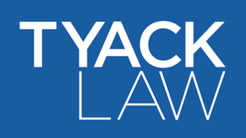
On December 28, 2021, the Ohio Supreme Court announced its acceptance of the jurisdictional appeal brought by Tyack Law attorneys James Tyack and Holly B. Cline on behalf of Ralph E. Bortree regarding the statute of limitations for an attempted murder or attempted aggravated murder offense in Ohio.
Statutes of limitations represent legislative assessments of relative interests of the State and the defendant in administering and receiving justice. United States v. Marion, 404 U.S. 307, 322 (1971). They “are made for the repose of society and the protection of those who may [during the limitation] * * * have lost their means of defence.” (Citation omitted.) Id. These statutes provide predictability by specifying a limit beyond which there is an irrebuttable presumption that a defendant’s constitutional right to a fair trial would be prejudiced. “The applicable statute of limitations * * * is * * * the primary guarantee against bringing overly stale criminal charges.” (Citation omitted.) Id. The effect of the State being able to prosecute a defendant for a crime decades later can be insurmountable: lost evidence, lost witnesses, and faded memories can make it difficult—if not impossible—for a defendant to present a meaningful defense.
Tyack Law attorneys argued in the Logan County Court of Common Pleas and the Third District Court of Appeals that under the plain and unambiguous language of R.C. 2901.13, attempted murder and attempted aggravated murder offenses have a six-year statute of limitation. Mr. Bortree was prosecuted in Logan County for attempted aggravated murder more than 26 years after the alleged offense was committed—even though law enforcement was made aware of the incident hours after it was alleged to have happened. It was undisputed in his case that none of the tolling events set forth in R.C. 2901.13 applied. Certain statutorily enumerated events will “toll” (or pause) the running of the statute of limitations for an offense. For instance, the statute of limitations will be tolled if a defendant flees the state for the purposes of avoiding prosecution or if the facts and circumstances of the crime (corpus delicti) have not yet been discovered by law enforcement or some other competent adult with the ability to report it.
Both the trial court and Third District Court of Appeals interpreted R.C. 2901.13(A)(2) as providing for no statute of limitations for attempted aggravated murder or attempted murder. In their jurisdictional appeal to the Ohio Supreme Court, Tyack Law attorneys cautioned that the lower courts’ holdings could be construed by overly zealous prosecutors as allowing the State to commence prosecution of a defendant alleged to have committed an assault-based offense at any time if the State charges the defendant with attempted murder and claims that the defendant’s conduct, if successful, would constitute or result in the purposeful causing of death of another. This is significant because the statute of limitations for felonious assault and aggravated assault—or attempts thereof—is six years unless the victim is a peace officer. [R.C. 2901.13(A)(3)]. In almost every case, an attempted murder could also be charged as some type of felony-level assault—aggravated assault or felonious assault—or attempts thereof. Tyack Law attorneys argue that allowing the State to prosecute a defendant for assault-based offenses within an unlimited timeframe merely because the State has charged the defendant with attempted murder flies in direct contravention to the Ohio legislature’s clear intention that only murder or aggravated murder offenses—not attempts thereof—have no statute of limitations.
Bortree also asked the Ohio Supreme Court to accept jurisdiction over a Second Proposition of Law that would determine whether the abandonment doctrine could be permissibly extended to the warrantless seizure and search of DNA material unavoidably shed and transferred onto items voluntarily discarded—in his case, saliva on a cigarette butt—under the Fourth Amendment to the United States Constitution and/or Article I, Section 14 of the Ohio Constitution. Tyack Law attorneys argued in the Memorandum in Support of Jurisdiction that when law enforcement warrantlessly seize a discarded cigarette butt, cup, or similar item to obtain unavoidably shed DNA material contained thereon, they must obtain a warrant issued by a neutral magistrate before extracting and analyzing that private DNA material for investigatory use if the item was discarded by a person not in custody and who is fully protected against warrantless searches and seizures under the Fourth and Fourteenth Amendments to the United States Constitution and/or Article I, Section 14 of the Ohio Constitution.
Three of the Ohio Supreme Court justices believed that this Proposition of Law should also be accepted by the Court for review. However, at least four justices—a majority of the Court—needed to agree to exercise jurisdiction over this proposition of law. Because they did not, the Court will only be considering the statute of limitations issue raised by Bortree in his Memorandum in Support of Jurisdiction.
Jurisdictional Appeals in Ohio
A jurisdictional appeal is an appeal that claims to involve a substantial constitutional question involving either the United State Constitution or the Ohio Constitution; an appeal that involves a felony; or an appeal that involves a question of public or great general interest.
With these cases, the Ohio Supreme Court exercises what is called its “discretionary jurisdiction,” meaning it can choose to accept the appeal or choose not to accept it. The Supreme Court will decide whether to accept a jurisdictional appeal after it reviews the jurisdictional memoranda and the opinion of the court of appeals.
In 2020, a total of 1,083 new jurisdictional appeals were filed. From those filed, the Ohio Supreme Court agreed to accept jurisdiction over approximately seventy-three (73) of those cases—less than seven percent (7%).
Talk with an experienced Lawyer today
Fill out the form to get started with your case evaluation.













